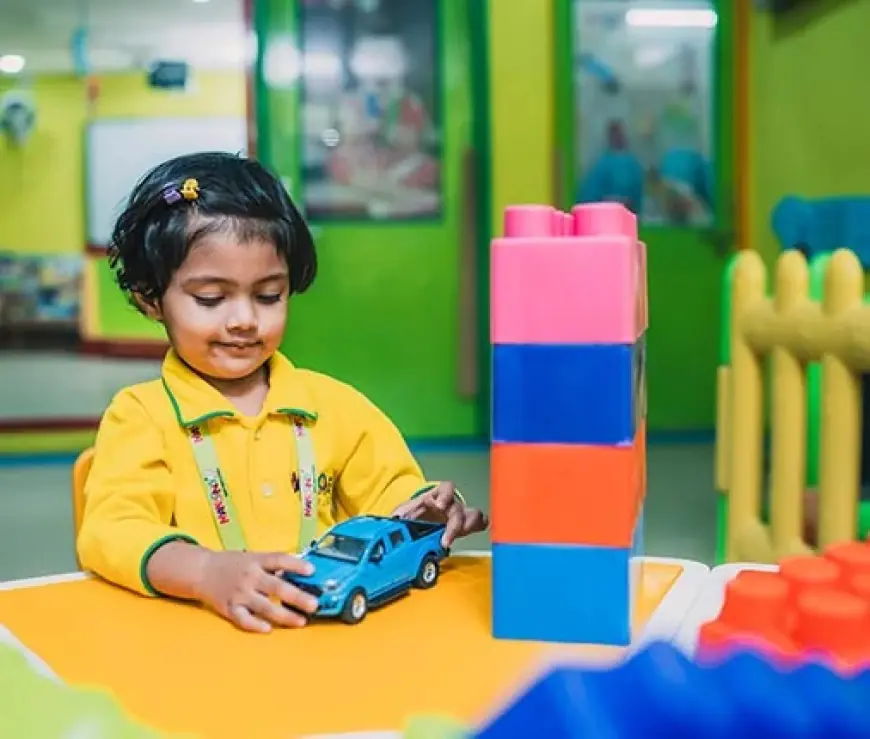Why Handwashing is Important for Kids During Rainy Season
In this blog, we will discuss the importance of handwashing during monsoon season, its impact on children’s health, and why schools—including those exploring a playschool franchise opportunity—must prioritize hand hygiene education.

The rainy season brings along refreshing showers, lush greenery, and cooler temperatures. However, it also poses significant health challenges, especially for children. With damp surroundings, stagnant rainwater, and increased chances of water and airborne infections, kids are more vulnerable to illnesses during this time of year. This is why handwashing becomes one of the simplest yet most powerful habits to keep children safe.
Hand hygiene is not just a personal care ritual; it is a habit that every play school for kids, kids school, and even the best schools in India emphasize to safeguard young learners. Schools and parents play a vital role in teaching children why and how they should wash their hands, particularly when diseases like flu, cold, diarrhea, and skin infections are common in the rainy months.
1. The Risks Children Face During Monsoon
Children are naturally curious and enjoy exploring their surroundings. Rainy season brings puddles, wet mud, and damp play areas that attract kids. While this encourages fun and exploration, it also exposes them to harmful germs. Some common health risks during the monsoon include:
-
Waterborne diseases like diarrhea, cholera, and typhoid.
-
Vector-borne illnesses such as dengue and malaria due to stagnant water.
-
Fungal and skin infections caused by humidity.
-
Airborne infections such as flu, cough, and common cold.
The habit of proper handwashing before eating, after using the washroom, or after playtime can drastically reduce the chances of these infections.
2. Why Handwashing Matters More for Children
Children have weaker immune systems compared to adults, making them more susceptible to seasonal illnesses. Moreover, kids in a play school for kids or early learning environment are always surrounded by peers. Sharing toys, books, and classroom materials increases the spread of germs.
When children wash their hands regularly with soap and water, they:
-
Remove dirt and harmful microorganisms.
-
Prevent illnesses from spreading to others.
-
Improve overall classroom hygiene.
-
Learn a valuable life skill that stays with them forever.
Thus, instilling proper hygiene practices at a young age is not just a health strategy but also an educational responsibility for every play school franchise or kids school.
3. How Schools Play a Role in Building the Habit
Most parents understand the importance of hygiene at home, but the real test is outside—at classrooms, playgrounds, and public places. Schools, especially play schools, are where young children spend most of their early learning years. Here’s how schools contribute to this essential habit:
-
Routine-based learning: Teachers in the best schools in India often include handwashing as part of the daily schedule. Kids wash hands before lunch, after play, and after outdoor activities.
-
Interactive methods: Rhymes, posters, and storytelling are used to teach children the step-by-step process.
-
Practical demonstration: Teachers demonstrate the importance of soap, water, and thorough scrubbing.
-
Facilities: A good kids school ensures child-friendly washbasins and easy access to soap and clean water.
This is why schools that offer a playschool franchise opportunity must have hygiene education as a core part of their curriculum. Parents today prefer schools that emphasize health and safety apart from academics.
4. Role of Parents at Home During Rainy Season
Handwashing is effective only when practiced consistently at home as well. Parents can support by:
-
Encouraging kids to wash hands before meals, after playing, and after touching rainwater.
-
Making the activity fun with colorful soaps or songs while handwashing.
-
Explaining in simple words how germs “travel” and cause tummy pain or fever.
-
Practicing the habit themselves, so children imitate.
When both parents and schools work hand-in-hand, children develop long-term hygiene habits.
5. Handwashing and the Future of Education in Early Childhood
The importance of hand hygiene also highlights a broader point in early education—health and safety standards are becoming decisive factors for parents choosing a school. Whether it’s a play school, kids school, or even the best school in India, hygiene policies are now part of their identity.
Aspiring entrepreneurs considering a play school franchise opportunity must recognize this cultural shift. Parents don’t just look for academic excellence or extracurricular activities; they also value the school’s approach to child health. Franchises that prioritize hygiene and wellness automatically gain parent trust and community goodwill.
In fact, a play school franchise that integrates hygiene practices like handwashing workshops, awareness programs for parents, and clean facilities is more likely to flourish in today’s education market.
6. Tips to Teach Kids About Handwashing During Rainy Season
Here are some child-friendly methods both parents and schools can adopt:
-
Visual aids – Use colorful posters in the classroom showing the correct steps.
-
Songs and rhymes – Teach handwashing steps with a fun tune children can remember.
-
Roleplay activities – Teachers and parents can roleplay as “germs” to explain why washing is important.
-
Reward system – Stickers or stars can encourage children to follow the habit regularly.
-
Storytelling – Narrating stories about how handwashing keeps “bad germs” away instills the message strongly in young minds.
These small yet impactful efforts directly reduce absenteeism in schools during the monsoon and encourage healthier daily routines.
7. Healthier Kids, Better Learning
For any kids school, student attendance is crucial to ensure steady learning progress. During the monsoon, absenteeism often increases due to waterborne and viral illnesses. But when children follow proper hygiene practices like handwashing, the chances of falling sick reduce significantly.
Healthy kids are happy kids. They perform better academically, participate actively in play-based learning, and show overall improvement in development. For parents, this ensures value and trust in the school. For schools—especially those running on a play school franchise model—it improves reputation, retention, and long-term success.
8. Looking at Broader Benefits
Hand hygiene does not just prevent seasonal sickness; it has long-term community benefits too:
-
Reduces the spread of epidemics in densely populated areas during monsoon.
-
Brings down the burden on healthcare systems.
-
Promotes discipline and cleanliness as lifelong habits.
-
Builds a healthier, more aware generation of students.
Hence the habit of handwashing, though very simple, holds immense power in shaping children’s futures both academically and personally.
Conclusion
The rainy season, while refreshing, poses many health challenges for children. Amidst the rising risk of infections, handwashing is one of the most cost-effective and reliable preventive measures. Instilling this habit in young learners ensures they remain safe and healthy while also fostering responsibility and discipline.
Every play school, kids school, and even institutions ranked among the best schools in India must prioritize hand hygiene in their curriculum and facilities. Parents too must reinforce the practice at home, making it part of their child’s daily routine.
For educators and entrepreneurs looking for a playschool franchise opportunity, incorporating hygiene practices like regular handwashing into the core values of their school is not just a necessity—it’s a competitive advantage. A well-rounded education today is incomplete without an emphasis on health and safety.
By joining hands—parents, teachers, and school leaders—we can raise healthier children who are not only immune to seasonal challenges but are also aware of the importance of cleanliness. And what better time to instill this than during the rainy season, when the importance of handwashing is most evident?
Read also:
https://makoons.com/blogs/10-best-kindergarten-school-franchise-in-india-in-2025/
What's Your Reaction?
 Like
0
Like
0
 Dislike
0
Dislike
0
 Love
0
Love
0
 Funny
0
Funny
0
 Angry
0
Angry
0
 Sad
0
Sad
0
 Wow
0
Wow
0





















































